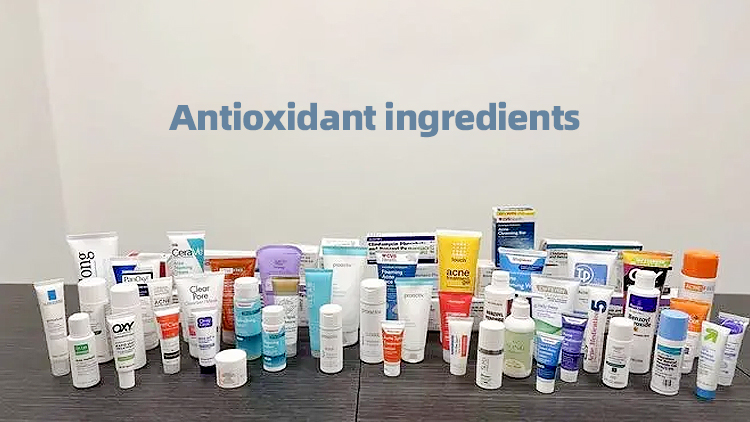Benzoyl peroxide (BPO): कोस्मेटिक्स और उद्योग में एंटीऑक्सिडेंट की पहली जागरी

बेंजोइल परॉक्साइड (CAS 94-36-0)  , जिसे प्रेरक के रूप में भी जाना जाता है BPO , एक ऐसा यौगिक है जिसने कोस्मेटिक्स और औद्योगिक अनुप्रयोगों में बहुत ध्यान आकर्षित किया है। इसके विशेष विघटन गुण विभिन्न उद्योगों में व्यापक उपयोग के लिए उपयुक्त हैं, विशेष रूप से कॉस्मेटिक्स और बहुलक सामग्री संश्लेषण के क्षेत्र में।
, जिसे प्रेरक के रूप में भी जाना जाता है BPO , एक ऐसा यौगिक है जिसने कोस्मेटिक्स और औद्योगिक अनुप्रयोगों में बहुत ध्यान आकर्षित किया है। इसके विशेष विघटन गुण विभिन्न उद्योगों में व्यापक उपयोग के लिए उपयुक्त हैं, विशेष रूप से कॉस्मेटिक्स और बहुलक सामग्री संश्लेषण के क्षेत्र में।
कॉस्मेटिक्स में बेंजोइल परॉक्साइड का एंटीऑक्सीडेंट अनुप्रयोग
बेंजोयल पेरॉक्साइड एक मान्यता प्राप्त त्वचा एंटीबैक्टीरियल और एंटीऑक्सीडेंट सामग्री है, जिसे आमतौर पर एंटी-ऐकन प्रोडक्ट्स में उपयोग किया जाता है। इसका मुख्य कारण यह है कि जब यह विघटित होता है, तो यह सक्रिय ऑक्सीडाइज़िंग पदार्थ उत्पन्न करता है, जो त्वचा की सतह पर बैक्टीरिया को अक्षम करने में कुशल होते हैं, विशेष रूप से प्रोपियोनिबैक्टरियम ऐकन्स, जो ऐकन का कारण बनता है। यह गुण बेंजोयल पेरॉक्साइड को एंटी-ऐकन फेस वॉश, त्वचा क्रीम और इलाज के जेल में बहुत आम बनाता है। यह केवल त्वचा की तेल की छिड़काव को कम करता है, बल्कि स्ट्रेटम कॉर्नियम पर एक थोड़ा सा एक्सफोलिएटिंग प्रभाव भी होता है, जिससे पोर्स को साफ करने और ऐकन के गठन को कम करने में मदद मिलती है।
सामान्य मिल्ड एंटीऑक्सिडेंट्स जैसे विटामिन सी और विटामिन ई की तुलना में, बेंजोइल परॉक्साइड अधिक शक्तिशाली होता है और मजबूत अक्ने को दूर करने के लिए उपयुक्त है। इसमें उच्च स्थिरता होती है और इसे लंबे समय तक स्टोर किया जा सकता है, जिससे यह जटिल सामग्रियों वाले कॉस्मेटिक्स में उपयोग के लिए उपयुक्त होता है। हालांकि, कॉस्मेटिक फॉर्मूलाओं में बेंजोइल परॉक्साइड की सांद्रता को त्वचा को उत्तेजित करने से बचाने के लिए नियंत्रित किया जाना चाहिए। इसलिए, उत्पाद विकास के दौरान, संभावित असुविधा को राहत देने के लिए आमतौर पर मोइस्चराइज़र्स या शांत करने वाले एजेंट्स जोड़े जाते हैं।

औद्योगिक क्षेत्र में बेंजोइल परॉक्साइड की प्रेरक भूमिका
बेंजोइल परॉक्साइड का उद्योग में सबसे महत्वपूर्ण उपयोगों में से एक विनिर्माण प्रणाली के रूप में है, विशेष रूप से प्लास्टिक, रबर और रेजिन के पॉलिमरीकरण में। एक कुशल विनिर्माण प्रणाली के रूप में, बेंजोइल परॉक्साइड एक निश्चित तापमान पर विघटित होकर मुक्त रेडिकल उत्पन्न करता है, जिससे पॉलिमरीकरण अभिक्रिया आरम्भ होती है। यह प्रक्रिया पॉलीएथिलीन, पॉलीप्रोपिलीन और पॉलीविनाइल क्लोराइड जैसी सामग्रियों के उत्पादन में व्यापक रूप से उपयोग की जाती है, प्लास्टिक उत्पादों के उद्योग के लिए मजबूत तकनीकी समर्थन प्रदान करती है।
पॉलिमराइज़ेशन अभिक्रियाओं में, बेंजोइल परॉक्साइड का उपयोग सरल होता है, इसकी प्रारंभिक कुशलता उच्च होती है, और यह कई मोनोमर्स के साथ संगत होता है, जिससे यह पॉलिमर सामग्री की तैयारी में बहुत लोकप्रिय हो जाता है। उदाहरण के लिए, पॉलीवाइनिल क्लोराइड (PVC) के उत्पादन प्रक्रिया में बेंजोइल परॉक्साइड को मुख्य प्रेरक के रूप में अक्सर जोड़ा जाता है ताकि पॉलिमराइज़ेशन दर और उत्पाद की गुणवत्ता का ध्यान रखा जा सके। इसके अलावा, इसके स्थिर विघटन तापमान विशेषताओं के कारण अभिक्रिया दर का नियंत्रण करना आसान होता है, इसलिए यह गर्मी-निर्दिष्ट रेझिनों के निर्माण में भी अक्सर उपयोग किया जाता है।

ऐमोनियम परसल्फेट के प्रेरक प्रभाव का परिचय
औद्योगिक अनुप्रयोगों में, बेंजोइल परॉक्साइड को अक्सर अन्य प्रेरकों के साथ जोड़कर उच्च उत्पादन कुशलता प्राप्त की जाती है। उदाहरण के लिए, ऐमोनियम सल्फेट (CAS 7727-54-0) एक मजबूत ऑक्सीडेंट है जिसे पॉलिमराइज़ेशन रिएक्शन में सहायक कatalyst के रूप में इस्तेमाल किया जा सकता है, जो पॉलिमराइज़ेशन प्रक्रिया को तेज़ करता है और उत्पाद की शुद्धता बढ़ाता है। प्लास्टिक और रबर के उत्पादन में, एमोनियम परसल्फेट को बेंजोइल परॉक्साइड के साथ इस्तेमाल किया जाता है ताकि पॉलिमराइज़ेशन की दक्षता में सुधार हो और अंतिम उत्पाद के यांत्रिक गुणों में सुधार हो।
एमोनियम परसल्फेट का इनिशिएटर्स में इस्तेमाल करने का फायदा यह है कि इसकी लागत कम होती है, ऑक्सीडेशन क्षमता मजबूत होती है और यह विभिन्न परिवेशों के लिए उपयुक्त है। हालांकि, इसकी मजबूत ऑक्सीडेशन क्षमता के कारण, एमोनियम परसल्फेट अधिक तीव्र प्रतिक्रियाओं का कारण बनने की संभावना अधिक होती है, इसलिए इसकी मात्रा और प्रतिक्रिया प्रतिबंधों को उद्योगी उत्पादन के दौरान ध्यान से नियंत्रित किया जाना चाहिए ताकि उत्पादन सुरक्षा सुनिश्चित हो।
ऐजोबिसआइसोब्यूटाइरोनाइट्राइल की उच्च कार्यक्षमता वाली प्रारंभिक कार्यक्षमता
पॉलिमराइज़ेशन के क्षेत्र में, Azobisisobutyronitrile (AIBN) (CAS 78-67-1)  एक सामान्य रूप से प्रयुक्त मुफ्त रेडिकल प्रेरक भी है। बेंजोइल परॉक्साइड की तुलना में, एजोबिसआइसोब्यूटिरोनाइट्राइल का वियोजन तापमान कम होता है और यह कम तापमान की स्थितियों में बढ़ाई अभिक्रियाओं के लिए उपयुक्त है। यह अक्सर पॉलीप्रोपिलीन और पॉलीएथिलीन जैसे प्लास्टिक उत्पादों के उत्पादन में प्रेरक के रूप में उपयोग किया जाता है, कम तापमान बढ़ाई अभिक्रियाओं के लिए अधिक सुविधाजनक विकल्प प्रदान करता है।
एक सामान्य रूप से प्रयुक्त मुफ्त रेडिकल प्रेरक भी है। बेंजोइल परॉक्साइड की तुलना में, एजोबिसआइसोब्यूटिरोनाइट्राइल का वियोजन तापमान कम होता है और यह कम तापमान की स्थितियों में बढ़ाई अभिक्रियाओं के लिए उपयुक्त है। यह अक्सर पॉलीप्रोपिलीन और पॉलीएथिलीन जैसे प्लास्टिक उत्पादों के उत्पादन में प्रेरक के रूप में उपयोग किया जाता है, कम तापमान बढ़ाई अभिक्रियाओं के लिए अधिक सुविधाजनक विकल्प प्रदान करता है।
इसके अलावा, एजोबिसआइसोब्यूटिरोनाइट्राइल के वियोजन उत्पाद अपेक्षाकृत मृदु होते हैं और अभिक्रिया प्रणाली को प्रदूषित करने की संभावना कम है, इसलिए यह अक्सर उच्च शुद्धता की मांगों वाले सामग्रियों के उत्पादन में उपयोग किया जाता है। एजोबिसआइसोब्यूटिरोनाइट्राइल का उपयोग कम तापमान पर अच्छी तरह से बढ़ाई अभिक्रियाओं को प्राप्त करने में मदद करता है, जो तापमान-संवेदनशील अभिक्रिया प्रणालियों के लिए बहुत मूल्यवान है। इसका बेंजोइल परॉक्साइड से भिन्न प्रभाव उद्योगी उत्पादन को विभिन्न अभिक्रिया स्थितियों के तहत अधिक विकल्प और लचीलापन प्रदान करता है, प्रक्रिया की कार्यक्षमता में सुधार करता है।

सustainabilयत और पर्यावरणीय पerspective
पर्यावरण संरक्षण और सustainabilयत कोष्टुकी और उद्योगिक क्षेत्रों में महत्वपूर्ण मामले बन गए हैं। भले ही पॉलिमेरीकरण के क्षेत्र में बेंजोइल परॉक्साइड का व्यापक रूप से उपयोग किया जाता है, इसके विघटन उत्पाद पर्यावरण पर एक निश्चित बोझ डालते हैं। इसलिए, बेंजोइल परॉक्साइड के विघटन को अधिक बेहतर बनाने और इसके पर्यावरण पर प्रभाव को कम करने पर अधिक से अधिक शोध केंद्रित हो रहा है।
औद्योगिक और कोष्टुकीय उत्पादन की सustainabilयत को और भी बढ़ाने के लिए, कई कंपनियां पारंपरिक प्रेरकों और कatalyst को कमजोर और पर्यावरण-अनुकूल विकल्पों से बदलने का पथ पर हैं। उदाहरण के लिए, कुछ R&D टीमें समान अभिक्रिया की दक्षता बनाए रखते हुए रासायनिक बोझ को कम करने के लिए हरे कatalyst का उपयोग करने का प्रयोग कर रही हैं। फिर भी ये नवीन तकनीकें विकास की स्थिति में हैं, वे भविष्य में एंटीऑक्सीडेंट बाजार को क्रांतिकारी परिवर्तन ला सकती हैं।
यदि आप उच्च-गुणवत्ता के एंटीऑक्सीडेंट्स और इनिशियेटर्स की तलाश में हैं, Foconsci Chemical Industry Co., Ltd. आपको पेशेवर समाधान प्रदान कर सकता है।
अधिक उत्पाद जानकारी के लिए या एक अनुमान प्राप्त करने के लिए हमसे संपर्क करें!


 EN
EN
 AR
AR
 BG
BG
 HR
HR
 CS
CS
 DA
DA
 NL
NL
 FI
FI
 FR
FR
 DE
DE
 EL
EL
 HI
HI
 IT
IT
 JA
JA
 KO
KO
 NO
NO
 PL
PL
 PT
PT
 RO
RO
 RU
RU
 ES
ES
 SV
SV
 TL
TL
 IW
IW
 ID
ID
 LV
LV
 LT
LT
 SR
SR
 SK
SK
 VI
VI
 HU
HU
 TH
TH
 TR
TR
 GA
GA
 CY
CY
 KA
KA
 LA
LA
 MN
MN
 KK
KK
 LB
LB


